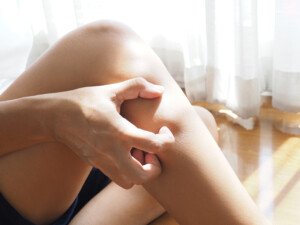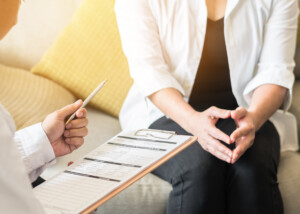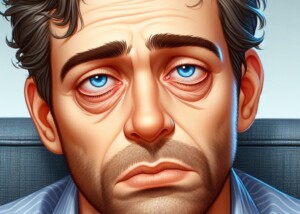Shannyn McCauley explains why her legs feel like worms are inside trying to get out, and the treatment she finally discovered that has dramatic results.
I’ve had RLS, or restless leg syndrome, for approximately 11 years. The first few years it was mild and I didn’t think much of it.
The sensations would come and go, appearing for a few hours, then disappearing for weeks at a time.
My father has it too, and he never seemed particularly bothered. He told me to eat more bananas; he felt the extra potassium helped.
Over the years I noticed the symptoms more and more. It started to become an annoyance and I modified my diet to include more potassium, magnesium and iron, after hearing this would likely help.
And it seemed like it did for awhile. But then I noticed the symptoms getting gradually worse again.
I told my doctor that I thought I had RLS, that my symptoms fit what I had read about the disorder, and that my father experienced the same feelings.
That it was starting to become a real hindrance in my life and felt like it was negatively affecting me emotionally as well.
Imagine for a minute that the veins in your lower legs turned into worms, trapped under your skin, wriggling, desperate to escape. That is how I felt.
Every second, of every minute, of every hour. I couldn’t sleep. My doctor told me I was probably sitting around too much.
I told him I was a nurse, running around, on my feet for eight hours a day. But that it was becoming difficult, as my legs felt easily fatigued and I was having trouble with stairs. I was sent home with nothing.
Two Types of RLS: Primary and Secondary
Secondary RLS can be caused by a number of things including low iron and pregnancy.
Primary RLS, like I have, is often genetic. There is no underlying issue that can easily be solved. It is a neurological disease.
So I told my doctor I wanted a referral to a neurologist. He refused, saying he could “manage” me just fine.
I disagreed since he would not prescribe me any medication and offered me no solutions.
I changed doctors, and while this new doctor was nicer, she still would not provide me a referral, which my insurance at the time required in order to see a specialist.
Drugs for RLS Didn’t Work
She cycled me through several medications after all my bloodwork came back normal, including Requip, Neurontin, Neupro and Lyrica.
With the exception of Lyrica, they all made me violently nauseous, a fairly common side effect, particularly for dopamine agonists like Requip and Neupro.
The Lyrica was extremely sedating and helped me get a few hours of (poor quality) sleep a night but it did not relieve the sensations even a little.
Over the years, I have also tried a number of over-the-counter drugs, herbal remedies and home remedies. Hot baths, melatonin, Tylenol, leg massages, heavy blankets, iron tablets, Epsom salts, magnesium cream, you name it, I’ve tried it.
RLS Is Very Misunderstood
I was starting to feel pretty depressed. I felt like I wasn’t being taken seriously by doctors.
There is a big misconception in the medical community that pain is the worst thing that can be experienced.
We have so many treatment options for pain, special pain management doctors, pain centers all over the country.
If you aren’t in terrible pain, then whatever is wrong with you can’t be that bad.
For someone who doesn’t have RLS to consider what it might feel like… I have found people don’t understand.
They don’t understand the discomfort and the frustration I feel. They act like getting only three hours of sleep a night is fine and you should just power through.
A doctor told me to “learn to deal with it” and suggested I try coffee. A coworker told me I should see a psychologist because “you just want something to be wrong with you.”
But let me tell you, I was born chronically ill and I had no desire to have anything more wrong with me.
I watched a bizarre episode of a crime drama where people wanted to be different, but instead of piercings or forked tongues, they had a body part amputated.
I found myself wondering if any doctor would actually do that — if I could trade my legs in for some futuristic robot legs. I had dreams about it. I felt like I was losing my grip, wondering if this was going to be the rest of my life.
Effective Treatment for RLS
Eventually my husband changed jobs, and I moved to a state with medical cannabis. I had read online that many people with RLS had found relief using this plant.
They weren’t on any other medications, sleeping though the night and had less daytime symptoms.
I contacted a doctor the same week I moved. He told me he had a number of RLS patients and it did indeed help them.
He wrote me the prescription and I got the medical card. (This cost a total of $250 since it is not covered by insurance.) I went to the dispensary and got some products to try as soon as I could.
I have been on it now for over a year and it has helped me dramatically. I usually take 2-5 mg of a CBD/THC tincture when I wake up, depending on how I am feeling, and 5-7 mg of THC/CBN combination before bed.
I can sleep normally, I’m able to work out longer, and I’m no longer emotionally drained by the disease.
I still have trouble with stairs, and I still feel the sensations, but they are much more dull. If there was a scale for RLS like there is for pain, I was at a 10 before, and now I’m around a 3.
It’s frustrating because this experience should not be common, but it is. I have met hundreds of people like me, who can’t access treatment, who aren’t being taken seriously.
They are depressed and suffering for no reason. It is beyond frustrating for me to see because I understand exactly what they are feeling.
I suffered for years before finding my OWN solution. If I hadn’t kept trying and kept researching, I would still be suffering. Actually, I’d probably be dead since you can only survive so long without sleep.
Restless leg syndrome is a very benign name. It’s a good name for the early stage of the disease, and many people never get worse from there.
But for those like me, in the severe category, the name is completely misleading and, I think, contributes to the lack of action, understanding and treatment.
 A certified health coach, Shannyn McCauley empowers those with restless leg syndrome or chronic pain to reduce their symptoms and take back their lives. instagram.com/healthcoachshannyn
A certified health coach, Shannyn McCauley empowers those with restless leg syndrome or chronic pain to reduce their symptoms and take back their lives. instagram.com/healthcoachshannyn
.










































